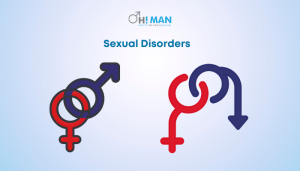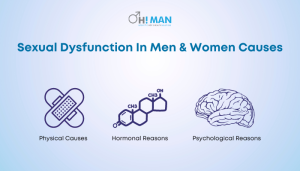Sexual Dysfunction : Symptoms, Causes & Treatment
Sexual Dysfunction : Symptoms, Causes & Treatment

Sexual dysfunction is a common problem that can happen during any phase of the sexual response cycle. The sexual response cycle includes excitement, plateau, orgasm and resolution. It affects both males and females and impacts the quality of the relationship, which could be the first sign of a mental or medical issue. It is different from asexuality and occurs at any age; in some cases, it increases by age.
As per the reports of Pubmed, 43% of women and 31% of males complain about experiencing sexual disorders, depending on age.
There are several treatments available that are accessible. You should consult your partner or a healthcare professional for the best treatment.
- Different Types of Sexual Dysfunction
- How many Individuals in India are Affected by Sexual Dysfunction?
- Causes of Sexual Dysfunction
- Symptoms Of Sexual Dysfunction
- Risk factors
- When to see a Doctor
- Sexual Dysfunction Diagnosing
- Sexual Dysfunction Treatment
- What Medication helps in Sexual dysfunction?
- Conclusion
- Frequently Asked Questions
- Different Types of Sexual Dysfunction
Different Types of Sexual Dysfunction

These are four general categories of sexual dysfunction, and these should not be considered a problem except if it happens regularly and affects your sex life.
1. Desire disorders
Desire disorder is a sexual disorder which causes Sexual dysfunction and occurs through a lack of sexual desire, low interest in sex life and passion for having sex, which usually happens because of no sexual fantasies or sexual thoughts, Avoiding sex or genital contact with your partner(sexual aversion disorder), distress at the thought of having sex and low libido. Low estrogen in women and testosterone imbalances in males, some medical problems, relationship issues, restlessness, depression, and anxiety, are also the reason for lower libido and desire disorder.
2. Arousal disorders
Arousal Disorder happens in both males and females, which creates an inability to become physically awake or aroused during sexual activity. The leading cause of arousal disorder in males is Erectile dysfunction, a sexual problem in which they cannot keep erect during sexual activity due to physical and psychological diseases. It can also be a cause of a combination of both of them. Sometimes both partners may be engaged in sexual engagement but unable to derive satisfaction from the intercourse because of arousal issues.
3. Orgasm Disorders
The reasons for organ disorders are painful sexual activity, stress, weariness, hormonal fluctuations, and diminished desire may result in a postponed or incomplete orgasm. These orgasm disorders also involve the lack of climax or a prolonged orgasm that typical women and males may also experience.
4. Pain Disorders
A pain disorder is a chronic pain experienced by both males and females in one or more areas. Pain in women could be due to vaginal dryness, vaginismus (a disorder affecting the vaginal walls), urinary tract infections (UTIs), hormone imbalances during the menopausal stage, pelvic congestion syndrome, or other Pain disorders. Conversely, males may have discomfort due to Peyronie’s disease, UTIs, prostatitis, genital herpes, and skin problems. Both men and women may experience discomfort during sexual activity, which may cause sexual dysfunction.
How many Individuals in India are Affected by Sexual Dysfunction?
According to limited community studies, sexual dysfunctions affect 10% to 52% of males in India and 25% to 63% of women in India, making them extremely common in both sexes. The Massachusetts Male Aging Study7 (MMAS) found that age, health condition, and emotional function were all significantly correlated with moderate to severe erectile dysfunction in 34.8% of males between the ages of 40 and 70.
Also read about erectile dysfunction in hindi
Causes of Sexual Dysfunction

There are numerous reasons for experiencing sexual dysfunction in men and women, which are classified into three parts: physical, hormonal and psychological.
Physical Causes include:
Several physical factors, including illnesses and conditions, contribute to sexual disorders:
- Urological diseases or cancer
- Diabetes
- Cardiovascular disease
- Elevated blood pressure
- Elevated cholesterol
- Hormonal abnormalities
- Pelvic congestion syndrome
- Alcohol dependency
- Drug dependency
- Neurological diseases
- Chronic illnesses, including kidney failure
- Nerve injury
Sexual dysfunction can be caused by various illnesses, such as cancer, kidney failure, etc. Apart from these reasons, some medications, such as antidepressants, blood pressure meds, antihistamines, and chemotherapy drugs, can reduce your body’s capacity to have orgasms and your desire for sex.
Hormonal Causes include:
The most often reported symptom of hormonal imbalance in males has decreased libido. Additionally, often mentioned by patients are irritability and mood changes. Men may also endure depressed moods and ongoing tiredness. The fuel for a man’s sexual desire and performance is not only Testosterone. However, low Testosterone might make it harder to have good sex. Low Testosterone can cause sexual issues, including erectile dysfunction and a lack of sex drive. In men, Testosterone works the same way as estrogen works in women.
In females, genital tissues and sexual receptivity may change due to lower oestrogen levels following menopause. A decrease in oestrogen causes the blood flow to the pelvic area to diminish, which can reduce genital feeling and lengthen the time it takes to reach orgasm.
The vaginal lining gets thinner and less elastic, especially if you don’t engage in sexual activity. These things may cause uncomfortable sexual encounters (dyspareunia). When hormone levels drop, so does sexual desire.
After giving birth and during nursing, your body’s hormone levels change, which can cause vaginal dryness and alter your desire for sex.
Psychological Causes Include:
Numerous individuals suffer from sexual dysfunction resulting from psychological causes. Worrying about sexual function, a sense of guilt regarding sex drive and interaction, relationship issues, anxiety, pressure, anxiety consciousness or self-esteem concerns, and previous sexual trauma, like sexual assault, molestation, or a bad sexual encounter, can all negatively impact sexual life.
Various medications may influence libido (desire) and the capacity to get excited or have an orgasmic experience. Additionally, when a patient takes numerous drugs, the likelihood of sexual adverse effects increases. Certain over-the-counter antihistamines and decongestants may induce impotence or ejaculatory difficulties.
Symptoms Of Sexual Dysfunction
Symptoms of sexual dysfunction in men and women depend upon underlying causes and disorders.
In men:
- Delay and absence of ejaculation(retarded ejaculation) despite adequate sexual excitement.
- Failure to regulate ejaculatory time (early or premature ejaculation during sexual activity).
- The inability to achieve or maintain an appropriate erection for sexual activity is another sign of male sexual dysfunction, also called erectile dysfunction.
In women:
- The incapability of reaching orgasm during sexual activity.
- Inadequate lubrication of the vaginal canal before and during the sexual engagement.
- Another symptom in females is Dyspareunia. It is a pain that occurs during sexual activity and may be brought on by an infection of the vulva or a constriction of the vaginal wall (vulvodynia).
Common Symptoms of Sexual dysfunction in both males and females are:
- Lack of sexual interest or drive usually occurs more in women than men.
- Inability to arouse oneself.
- Pain associated with sexual activity.
Risk factors
The following factors may impact your risk of sexual dysfunction:
- Depression or anxiety.
- Heart and blood vessel disease.
- Neurological diseases include multiple sclerosis and spinal cord damage
- Gynaecological disorders such as lichen sclerosis, infections, or vulvovaginal atrophy.
- Several drugs, including antidepressants and medications for high blood pressure.
- Emotional or psychological strain, particularly concerning a partner’s connection
- A background of sexual abuse.
When to see a Doctor
If sexual issues continue, both partners may experience anxiety. If sexual dysfunction is not treated, it could get worse.
You should visit your doctor if the problem continues or if you believe there may be a physical cause. For better treatment, you should provide a detailed medical history and a list of all current prescription and OTC drugs to your doctor and describe your issue to your doctor in detail.
For men
If you are dealing with these kinds of problems, then you should concern with your doctor.
- Erectile dysfunction
- Retarded ejaculation
- Premature ejaculation or Shighrapatan
For women
If you are dealing with these kinds of problems, then you should concern with your doctor in your early stage.
- The incapability of reaching orgasm
- Insufficient vaginal lubrication before and during sexual activity.
- Incapability to relax the vaginal walls sufficiently to conduct the sexual activity.
- Dyspareunia
Sexual Dysfunction Diagnosing
Most of the time, you can tell whether something is preventing you from enjoying your sexual connection or that of your partner. A thorough history of symptoms and a physical are often the first steps taken by your doctor. To rule out any underlying medical conditions that could be causing the dysfunction, they may request diagnostic tests. Lab testing often has a very small impact on the diagnosis of sexual dysfunction.
The first session will generally include the following:
- Medical and sexual history review.
- Medical examination.
- A discussion of complaints and concerns.
Moreover, your physician may also propose diagnostic testing to identify or exclude medical disorders that might contribute to or aggravate sexual dysfunction.
Further, your doctor will ask about your thoughts and beliefs on establishing sexual relations or any past incident contributing to your present sexual life. Further, the doctor might ask if any phobias, anxieties, or prior accidents might contribute to sexual dysfunction.
Along with your thoughts and beliefs regarding sex and sexuality, your doctor may inquire about any phobias, worries, or previous traumatic events that may be linked to sexual dysfunction. Sexual dysfunction is a common problem, and both male and female sexual dysfunction may be treated. It’s nothing to be ashamed of.
Sexual Dysfunction Treatment
Any man or woman experiencing sexual dysfunction should note that available treatments can address their sexual disorders. Physical, Hormonal and psychological reasons for sexual disorders have solutions, and you may observe significant improvement in your sexual concerns.
Typically, sexual dysfunction is addressed by rectifying or treating the underlying cause or conditions causing it. Medicines or mechanical assistance will likely help you if the reason is physical. If the issue is psychological, counselling, therapy, behavioural interventions, and sex education and telling about first time sex tips to the young one’s may be effective treatments. Further, some individuals with sexual problems may have medical and psychological reasons requiring both therapies.
Below is some possible sexual dysfunction treatment.
Medical treatment for Sexual dysfunction
If a medical problem is the cause of your disorder, your physician will work with you to address the issue. So, a hormone imbalance is a frequent cause. Both men and women can opt for hormone treatment like testosterone replacement therapy after consulting the doctor to restore their normal hormone functioning. Further, other medications that contain antidepressants, like Viagra (sildenafil), may help in the fight against stress & enhance blood flow to the genitals.
If Medication contributes to your sexual dysfunction, your doctor might recommend altering the prescribed medicine. As a result, it won’t interfere with your sexual performance.
By boosting blood flow to the penis, medications such as sildenafil, vardenafil, tadalafil, and avanafil may enhance sexual performance in men. However, you must consult with doctors to get the exact dosage.
If any medications don’t work, the doctor might prescribe self-administered penile injections to help treat sexual dysfunction. By easing the smooth muscle of the blood vessels, the blood vessels widen, and blood fills the penis. In most circumstances, injections for erectile dysfunction must not be taken with oral drugs for erectile dysfunction that function similarly.
Doctors might prescribe hormone medication for women, although the medicines aren’t authorized.
Treatment through Devices
Men who have trouble achieving or sustaining an erection may succeed in using a vacuum pump for erectile dysfunction or penile pumps. So these devices work by drawing blood flow to your genitals, resulting in a firm erection. For any male with penile deformity, penile implants are possible. Further, if any man has Peyronie’s Disease, penile traction devices can reduce the curvature due to this disorder.
Vaginal constriction may be alleviated with the use of dilators. Further, enhancing sexual pleasure and climaxes such vibrators can be beneficial.
Treatment through Therapy
Psychotherapy and sex therapy are Cognitive behavioural therapy for the psychological causes and hormonal causes of sexual dysfunction. Counsellors may assist individuals in overcoming fear, tension, anxiety, prior trauma, self‐esteem concerns, and other obstacles to a satisfying sexual life. Additionally, sexual therapists may also assist couples with sexual difficulties. Further, sex therapists may help couples resolve issues in a manner that most doctors cannot.
Psychologists and sex psychologists may propose sex education, establishing communication and sexual preferences, and behavioural therapies that may resolve underlying difficulties and assist individuals and couples in discovering practical approaches.
Sex Education & Communication
Educating sex and sexual behaviours and responses may help overcome sexual function-related anxiety. Open communication with your spouse about your wants and worries also assists in overcoming several obstacles to a good sexual life.
What Medication helps in Sexual dysfunction?
According to the doctor, this problem should be treated naturally, but in some cases, these problems create risk factors; as you read above, the doctor prescribes Medication.
We at Ohman help males in treating various sexual dysfunction. Further, we understand how frustrating it is to deal with sexual problems. Hence, we offer online consultation. Ohman has experts who can effectively address any medical condition and offer the best erectile dysfunction medicines, as well as The Best premature ejaculation medicines in India, and several other medications, such us.
- Delay Capsules
- Korean Red Ginseng
- Herb Mix Tablet
- Curvature Correction Pack
- All Natural Last long Pack
- Date Night Essentials Pack
As well As
Conclusion
Note that moderate dysfunction caused by stress, fear, or worry may frequently be resolved with therapy, education, and increased relationship communication. To enhance your sex life, you must be committed and actively keep your health in good condition. Further, sexual dysfunction occurs in most individuals at some point, and if the issue persists, you should get assistance.
Don’t let sexual disorders take over your sex life. The Ohman experts are here to help you. Book an online consultation today.
Frequently Asked Questions
1. Can sexual problems last a lifetime?
Men who could previously maintain an erection are most often affected by ED. The likelihood of thoroughly treating ED depends on the underlying cause; however, the disease is typically reversible.
2. Can sexual dysfunction cause anxiety?
Yes, anxiety can be defined as the experience of concern, trepidation, or uneasiness over a situation whose conclusion is unclear. The most prevalent mental health ailment in Indian males is anxiety, which they will encounter at some point in their lives.
3. Can sexual dysfunction cause insomnia?
The prevalent sleep problems, obstructive sleep apnea, insomnia, shift work disorder, and restless legs syndrome are all linked to ED or other urological illnesses. Therefore, in individuals with sexual dysfunction, particular consideration should be given to the diagnosis and treatment of coexisting sleep problems.
4. What is the most common reason for sexual dysfunction?
Erectile dysfunction can be brought on by physical conditions such as heart disease, high cholesterol, high blood pressure, diabetes, obesity, and smoking. Conversely, sexual emotions can also be hampered by mental health issues like melancholy, anxiety, stress, and relationship issues.
5. Sexual dysfunction in diabetes?
Sexual dysfunction is a widespread issue that is more likely in both men and women with diabetes. It has been linked to a significantly worse quality of life and psychological suffering in people with type I diabetes.
6. Can sexual dysfunction cause a heart attack?
Erectile dysfunction and heart disease are extremely closely related. According to several studies, men who experience ED are more likely to develop heart disease. A history of smoking or a family history of coronary artery disease are risk factors for heart disease, but so are ED symptoms.



